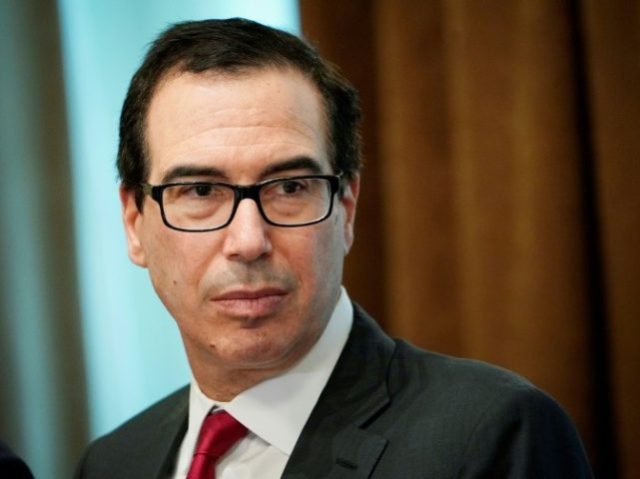The U.S. Treasury Department issued proposed rules on Thursday to nix California’s scheme to avoid the new $10,000 limit on state and local tax deductions by claiming taxes are charitable donations.
President Donald Trump promised in December 2017 that his $1.5 trillion Tax Cuts and Jobs Act tax-reform package would unleash a new era of American prosperity by cutting the tax burden for the typical family of four earning $75,000 by $2,000. The tax cuts also aimed to drive up the average household income by $4,000 through simulative cuts on business by permanently trimming the top corporate rate from 35 percent to 21 percent.
To fund part of the resulting revenue loss, the Republican-controlled U.S. House of Representatives limited federal deductions for state and local taxes (SALT) to $10,000 for the first time. The move hammered high income tax-payers in Democrat-dominated high-tax blue states like California, Illinois, New York and New Jersey.
According to the Tax Policy Institute, the first-time ever cap on SALT deductions was expected to generate $36.1 billion more in federal tax collections in 2018. But the pain to high-income tax-payers in California and the other so-called “deep-blue” states doubles to $74.5 billion in 2021 and almost triples to $100.4 billion by 2025.
Four days after Trump’s tax reform took effect on January 1, then-State Senate leader Kevin de León (D-Los Angeles) proposed “SB-227 Education finance: Local Schools and Colleges Voluntary Contribution Fund” to allow any Californian that had more than $10,000 in state and local tax deductions to make a dollar-for-dollar charitable donation to the “California Excellence Fund” for a dollar-for-dollar state tax credit to avoid the SALT limits.
De Leon, who is running for U.S. Senate, tried to justify draining federal taxes to the San Jose Mercury News: “The Republican tax plan gives corporations and hedge-fund managers a trillion-dollar tax cut and expects California taxpayers to foot the bill,” He added, “We won’t allow California residents to be the casualty of this disastrous tax scheme.”
Although federal law allows charitable deductions for over-payment of taxes to those each year that want to donate to help pay down public debt or maintain a park under IRC § 170, the contributions must be “solely for public purposes.”
But Treasury Secretary Steven T. Mnuchin released a statement on August 23 indicating that California’s “charity” was a scheme to avoid paying federal taxes: “Congress limited the deduction for state and local taxes that predominantly benefited high-income earners to help pay for major tax cuts for American families.” He added, “The proposed rule will uphold that limitation by preventing attempts to convert tax payments into charitable contributions.”
The new U.S. Treasury-proposed rule, according to The Hill, would only allow taxpayers to claim the federal charitable deduction under “quid pro quo” guidelines for the amount of donations that exceeds the amount they received in tax credits.
As an example, if the taxpayer donated $1,000 to the California SB-227 state charity and received a 50 percent state tax credit, the taxpayer would only be able to claim a federal charitable deduction of $500, according to the Treasury Secretary.
Mnuchin emphasized that the Treasury Department has projected that 90 percent of U.S. taxpayers that do not file tax returns with standard deductions will not be impacted by the SALT limits. The 5 percent of U.S. taxpayers who file itemized returns with income tax deductions above the $10,000 will be unable to exploit the charitable deduction to avoid the SALT cap.

COMMENTS
Please let us know if you're having issues with commenting.